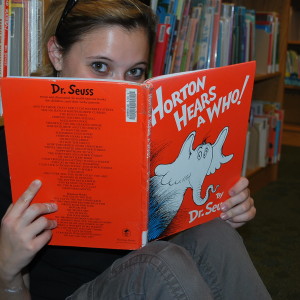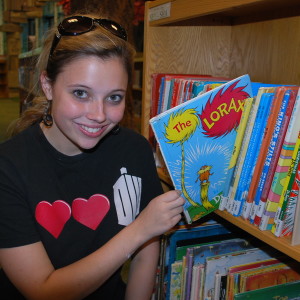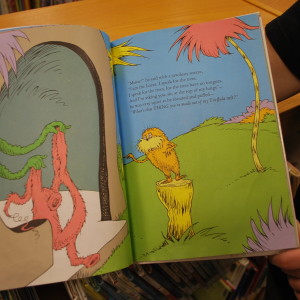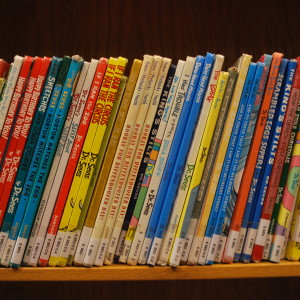It’s been a month into AP Language and Composition and already I am feeling the effects of my teacher, Mr. Baker, on my way of thinking and arguing. This transformation became evident when I was writing a review (which may perhaps be a smidge too scathing for a kid’s movie) on Netflix about the animated adaptation of Doctor Seuss’ The Lorax. When I saw it a couple months ago with a group of little girls I was watching, I couldn’t pinpoint what exactly had irritated me about it. Sure the songs were a bit obnoxious and the slapstick humor wasn’t exactly my style, but it was a kid’s movie and it was meant for consumption by people who did not understand sarcasm or socio-political satire, so I dismissed my annoyance as a mere effect of my growing alienation from children’s animation.
Now I have always been susceptible to fits of ranting on random subjects (as evident in my previous post of Paleolithic Art), but I have rarely transformed my idle blustering to my friends into real arguments on the merits of craft, but after a month of AP Lang, I suddenly find myself putting these strange abstract feelings into words and communicating them in a more effective manner than “That movie was soooo lame.”
Now I have always been a fan of Doctor Seuss. His books were some of the earliest forms of literature I was exposed to as a young child cuddling in bed surrounded by stuffed animals as my parents read Oh! The Places You’ll Go!, Green Eggs and Ham, and of course The Lorax to me at night before I closed my eyes to sleep. I think Doctor Seuss was a master a capturing not only the whimsy and imagination of children in his lyrical and playful verses, but also at conveying complex and profound subjects into a form that young children could comprehend. The Star-Bellied Sneetches exposed us to and explained to us concepts like prejudice, bullying, and discrimination and how we could surmount it. How the Grinch Stole Christmas imparts a message that true happiness in life is not found in material possessions, but in love between people. Thidwick the Big Hearted Moose communicates to young children about how sometimes people can take advantage of one’s generosity and there may come a time when it is best to let go of parasitic relationships. Seuss had a gift for imparting universal themes in the guise of light-hearted fantasy stories and nonsensical rhymes, that is why I got upset when I saw Hollywood once again losing sight of the beauty and power of Seuss’ works.
The book, The Lorax seems at first to be merely a promotion for environmental responsibility. The bad guy cuts down trees, the ecosystem dies, and it all could have been prevented if he hadn’t been so mean, moral of the story is don’t cut down any trees or bad things will happen, The End. But the true meaning behind The Lorax is something far more profound and insightful. It is all about taking personal responsibility for one’s actions. Seuss does not end his story on the destruction of the Truffella Forests, nor does he show us a shining new world of environmental friendliness. No, The Lorax is a far deeper examination of our human psyche than that. The book ends on the powerful and weighty word “Unless”, asserting Seuss’ argument that true positive change is impossible unless the individual takes personal responsibility for his or her own deeds. He contends that things will only get worse until you, the audience, take the initiative to make the change happen. Only the individual (and by extension the community of individuals) can make things better, and the crux of Seuss’ argument is that it is the children, the audience of the book, who are responsible to implement that change. Seuss is not addressing the corporations who make the pollution, nor does he call for the CEOs of polluting companies to resign or clean up their mess. He does not project the problems of society on its perceived destroyers but calls its denizens to accept their own culpability in the destruction. He calls for us, the children, to take a stand and to change our ways. In the words of Doctor Seuss, “Unless someone like you cares a whole awful lot, nothing is going to get better, it’s not.”
I guess it comes back down to the movie The Lorax. I guess I did not like it because despite its breathtaking animation and star-studded cast, it missed an integral meaning of Seuss’ words. Instead of portraying an allegory of projection and lack of personal responsibility that leads to cataclysm, it gave us pretty and obvious propaganda. It lost the beauty and subtlety of Seuss’ argument and instead focused on a ham-fisted love story and a transparent vilifying of forced-consumerism (which is ironic when juxtaposed to the way the movie was so heavily marketed and merchandised in everything from pancakes to Mazdas) while losing the theme of personal responsibility. I especially did not like the subject matter of the people of Thneedville being coerced into their sins by the evil capitalists. It destroyed the element of willful participation into destructiveness that the book so artfully encapsulated.
I know this is a kid’s movie, but I think kids are just as good at recognizing the implications of a movie or book’s message and anyone, perhaps even better because they aren’t as intoxicated with the drug of projection as older people are. It makes me think about how we are so ingrained in our society to blame the government or corporations for our troubles when in reality change starts with you. We learn in church that we can only get out of sin through taking personal responsibility for our actions and then giving our whole hearts to God. We can’t blame our parents, society, or our human nature for our immorality but must realize that it is we, not society that must be transformed.
It’s a lot to ponder and I know I can go off into tangents, so I’ll shut down before it gets crazy. Thank you Mr. Baker for helping me find my voice, even when it leads me to attack random children movies, let’s hope you have not created a monster. But more importantly, thank you God, and especially Gwen Shamblin and my church, Remnant Fellowship, for allowing me to see the truth and be able to accept personal responsibility.

“I find television very educational. Every time someone switches it on I go into another room and read a good book.” – Groucho Marx



